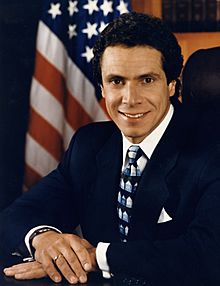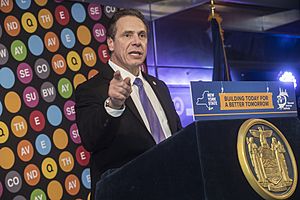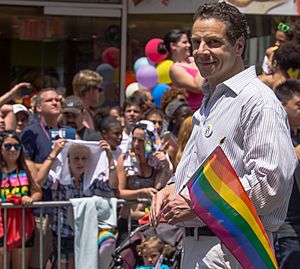Andrew Cuomo facts for kids
Quick facts for kids
Andrew Cuomo
|
|
|---|---|
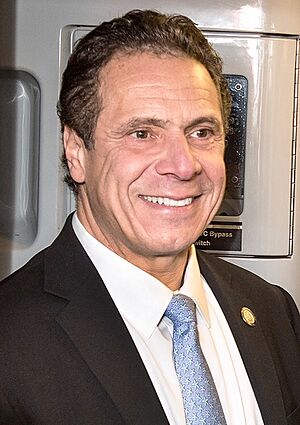
Cuomo in 2017
|
|
| 56th Governor of New York | |
| In office January 1, 2011 – August 23, 2021 |
|
| Lieutenant |
|
| Preceded by | David Paterson |
| Succeeded by | Kathy Hochul |
| Chair of the National Governors Association | |
| In office August 5, 2020 – July 8, 2021 |
|
| Vice Chair | Asa Hutchinson |
| Preceded by | Larry Hogan |
| Succeeded by | Asa Hutchinson |
| Vice Chair of the National Governors Association | |
| In office July 26, 2019 – August 5, 2020 |
|
| Chair | Larry Hogan |
| Preceded by | Larry Hogan |
| Succeeded by | Asa Hutchinson |
| 64th Attorney General of New York | |
| In office January 1, 2007 – December 31, 2010 |
|
| Governor | Eliot Spitzer David Paterson |
| Preceded by | Eliot Spitzer |
| Succeeded by | Eric Schneiderman |
| 11th United States Secretary of Housing and Urban Development | |
| In office January 29, 1997 – January 20, 2001 |
|
| President | Bill Clinton |
| Deputy | Saul N. Ramirez Jr. |
| Preceded by | Henry Cisneros |
| Succeeded by | Mel Martínez |
| Assistant Secretary of Housing and Urban Development for Community Planning and Development | |
| In office May 28, 1993 – January 29, 1997 |
|
| President | Bill Clinton |
| Preceded by | Skirma Kondratas |
| Succeeded by | Saul N. Ramirez Jr. |
| Personal details | |
| Born |
Andrew Mark Cuomo
December 6, 1957 New York City, U.S. |
| Political party | Democratic |
| Spouse | |
| Domestic partner | Sandra Lee (2005–2019) |
| Children | 3 |
| Parents | Mario Cuomo Matilda Raffa |
| Relatives | Cuomo family |
| Education | |
| Occupation |
|
| Signature |  |
Andrew Mark Cuomo (/ˈkwoʊmoʊ/ KWOH-moh, Italian: [ˈkwɔːmo]; born December 6, 1957) is an American politician, lawyer, and former government official who served as the 56th governor of New York from 2011 until his resignation in 2021. A member of the Democratic Party and son of former governor Mario Cuomo, Cuomo previously served as the attorney general of New York from 2007 to 2010.
Born in Queens, New York City, Cuomo is a graduate of Fordham University and Albany Law School. He began his career working as the campaign manager for his father in the 1982 New York gubernatorial election. Later, Cuomo entered the private practice of law and chaired the New York City Homeless Commission from 1990 to 1993. Cuomo then served in the United States Department of Housing and Urban Development as assistant secretary from 1993 to 1997 and as secretary from 1997 to 2001 under President Bill Clinton. Cuomo was elected New York attorney general in 2006, after a failed bid to win the Democratic primary in the 2002 New York gubernatorial election.
Cuomo won the 2010 Democratic primary for governor of New York and won the general election with over 60 percent of the vote. He was re-elected in 2014 and 2018. During his governorship, Cuomo signed legislation to legalize same-sex marriage. Cuomo's administration oversaw the construction of the Governor Mario M. Cuomo Bridge, the Second Avenue Subway, the Moynihan Train Hall, and a reconstruction of LaGuardia Airport. He also decommissioned the Indian Point nuclear plant, which led to an uptick in greenhouse gas emissions. Cuomo signed the NY SAFE Act of 2013, the strictest gun control law in the United States. He also delivered Medicaid expansion under the Affordable Care Act; a 2011 tax code that raised taxes for the wealthy and lowered taxes for the middle class; 12-week paid family leave; and a gradual increase of the state's minimum wage to $15 per hour. Cuomo received national attention for his handling of the COVID-19 pandemic in New York. Although he was initially lauded for his response, he faced renewed criticism and federal investigation after it was alleged that his administration covered up information pertaining to COVID-19 deaths among nursing home residents who died in hospitals. Investigations by both the Department of Justice and the Manhattan District Attorney's Office were officially closed as a result of no evidence of wrongdoing.
In 2021, Cuomo resigned from office and was succeeded by his lieutenant governor, Kathy Hochul. At the time of his resignation, he was the longest-serving governor in the United States.
Contents
- Early life and education
- Early career
- Secretary of Housing and Urban Development
- Private sector
- 2002 New York gubernatorial election
- New York attorney general
- Consideration for U.S. Senate appointment
- Gubernatorial elections
- Governor of New York (2011–2021)
- Post-gubernatorial career
- Electoral history
- Personal life
- Published works
- See also
Early life and education
Andrew Mark Cuomo was born on December 6, 1957, in the New York City borough of Queens to lawyer and later governor of New York Mario Cuomo and Matilda (née Raffa). His parents were both of Italian descent; his paternal grandparents were from Nocera Inferiore and Tramonti in the Campania region of southern Italy, while his maternal grandparents were from Sicily (his grandfather from Messina). He has four siblings; his younger brother, Chris Cuomo, is a current NewsNation anchor and a former CNN journalist, and his elder sister is noted radiologist Margaret Cuomo.
Cuomo graduated from Archbishop Molloy High School in 1975. He earned a Bachelor of Arts from Fordham University in 1979 and a Juris Doctor from Albany Law School in 1982.
Early career
During his father's successful 1982 campaign for governor, Cuomo served as campaign manager. He then joined the governor's staff as a policy advisor and sometime Albany roommate, earning $1 a year. As a member of his father's administration, Cuomo was known as the "enforcer" where his father was known as the "nice guy" in a good cop/bad cop dynamic to further advance his father's legislative agenda.
From 1984 to 1985, Cuomo was a New York assistant district attorney and briefly worked at the law firm of Blutrich, Falcone & Miller. He founded Housing Enterprise for the Less Privileged (HELP) in 1986 and left his law firm to run HELP full time in 1988. From 1990 to 1993, during the administration of New York City mayor David Dinkins, Cuomo was chair of the New York City Homeless Commission, which was responsible for developing policies to address homelessness in the city and providing more housing options.
Secretary of Housing and Urban Development
Cuomo was appointed Assistant Secretary for Community Planning and Development in the Department of Housing and Urban Development (HUD) in 1993, a member of President Bill Clinton's administration. After the departure of Secretary Henry Cisneros at the end of Clinton's first term under the cloud of an FBI investigation, Cuomo was unanimously confirmed by the United States Senate to succeed him as Secretary of HUD. Cuomo served as Secretary from January 1997 until the Clinton administration ended in 2001.
In 2000, Cuomo led HUD efforts to negotiate an agreement with United States handgun manufacturer Smith & Wesson. This agreement required Smith & Wesson to change the design, distribution, and marketing of guns to make them safer and to help keep them out of the hands of children and criminals. Budgets enacted during Cuomo's term contained initiatives to increase the supply of affordable housing and home ownership and to create jobs and economic development. These included new rental assistance subsidies, reforms to integrate public housing, higher limits on mortgages insured by the Federal Housing Administration, a crackdown on housing discrimination, expanded programs to help homeless people get housing and jobs, and creation of new empowerment zones.
During Cuomo's tenure as HUD Secretary, he called for an increase in home ownership. He also pushed government-sponsored lenders Fannie Mae and Freddie Mac to buy more home loans issued to poor homeowners in an attempt to end discrimination against minorities. Some believe that this helped lead to the 2007–2010 subprime mortgage crisis. Edward J. Pinto, former chief credit officer at Fannie Mae, said: "They should have known the risks were large." Pinto said, "Cuomo was pushing mortgage bankers to make loans and basically saying you have to offer a loan to everybody." But others disagree with the assessment that Cuomo caused the crisis. Dean Baker, co-director of the Center for Economic and Policy Research, said Cuomo "was a contributor in terms of him being a cheerleader, but I don't think we can pin too much blame on him".
According to libertarian author and critic James Bovard, Cuomo was obsessed with changing HUD's image, as Cuomo declared, "The PR is the important thing I do... Eighty percent of the battle is communications." He championed a new program called Community Builders, created without appropriation by Congress, for 800 new HUD employees with computers to be paid as much as $100,000. In a June 16, 1999, speech, Cuomo declared that one purpose of the program was to fight against HUD's abolition. In August 1999, Community Builders distributed a letter to community groups to fight against proposed tax cuts. One HUD official declared that Community Builders was seen as "Democratic ward heelers who act as a pipeline between Democratic city officials, party leaders, and the administration and the Democratic National Committee."
In 1998, Clinton-appointed HUD inspector general Susan Gaffney testified to a Senate committee that she was the victim of "'escalating' attacks on her office by Cuomo and 'his key aides,' including cooked-up charges of racism, insubordination, malfeasance, and general dirty-dealing". In 1999, Gaffney's office concluded that "most (15 out of 19) Community Builders' goals were activities rather than actual accomplishments" and that Cuomo's initiatives "had a crippling effect on many of HUD's ongoing operations". Gaffney retired in May 2001, shortly after the department reached a $490,000 settlement with a black employee who had accused her of racial discrimination in passing him over for a promotion.
Prior to Cuomo's tenure, HUD was routinely included on the General Accounting Office's biannual watch list of government programs whose poor management made them prone to fraud. During his time in office, two of HUD's four main departments were removed from the GAO list. In addition, the department cut 15 percent of its staff as part of a Cuomo initiative to streamline its operations.
Private sector
From 2001 to 2006, Cuomo was not in government. He worked at the Fried Frank law firm from 2001 to 2004 and later the Island Capital real estate firm.
2002 New York gubernatorial election
Cuomo first ran for the Democratic nomination for the New York governor seat in 2002. He was initially the favorite for the nomination and led in fundraising and polls, but his campaign took serious damage after a gaffe. Speaking about the aftermath of the September 11 attacks, Cuomo said, "Pataki stood behind the leader. He held the leader's coat. He was a great assistant to the leader. But he was not a leader. Cream rises to the top, and Rudy Giuliani rose to the top." His remarks were widely derided; even his father, former governor Mario Cuomo, later admitted it was a blunder.
On the eve of the state convention, Cuomo withdrew from consideration after concluding that he had little chance of support against the favored party candidate, State Comptroller Carl McCall. McCall went on to lose the general election to incumbent George Pataki.
New York attorney general
Election
Cuomo declared his candidacy for the Democratic nomination for New York state attorney general in 2006 and on May 30, 2006, captured the Democratic Party's endorsement, receiving 65% of the delegates. Though Cuomo won the endorsement, former New York City public advocate Mark Green and two-time candidate for Lieutenant Governor Charlie King also earned places on the Democratic ballot. King dropped out of the race before the primary and endorsed Cuomo.
Cuomo won the primary with a majority of the vote, defeating his nearest opponent by over 20%. Clinching the Democratic party nomination was considered a significant rebound following his unsuccessful and unpopular 2002 gubernatorial campaign, and at the nominating convention June O'Neill, the Democratic chairwoman of St. Lawrence County, called him "New York's own Comeback Kid". In the general election on November 7, 2006, he defeated the Republican nominee, former Westchester district attorney Jeanine Pirro, winning 58% of the vote.
Tenure
Police surveillance, 2007
On July 23, 2007, Cuomo's office admonished the Spitzer administration for ordering the New York State Police to keep special records of then Senate majority leader Joseph Bruno's whereabouts when he traveled with police escorts in New York City. At the discretion of top officials of the Spitzer administration, the created documents meant to cause political damage to Bruno. Spitzer responded by accepting responsibility and issuing an apology to Bruno.
Student loan inquiry, 2007
In 2007, Cuomo was active in a high-profile investigation into lending practices and anti-competitive relationships between student lenders and universities. Specifically, many universities steered student borrowers to a "preferred lender", which resulted in the borrowers' incurring higher interest rates. This led to changes in lending policy at many major American universities. Many universities also rebated millions of dollars in fees to affected borrowers.
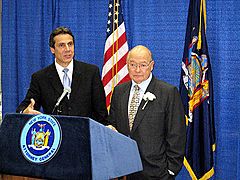
Corruption and fraud investigations, 2009
Cuomo investigated a corruption scandal, a "fraudulent scheme to extract kickbacks", which involved New York investigators, the Securities and Exchange Commission, and attorneys general in dozens of states.
Consideration for U.S. Senate appointment
After Hillary Clinton became President Obama's choice for U.S. secretary of state in December 2008, then–New York governor David Paterson was charged with appointing a temporary replacement until a special election. Cuomo was seen as a leading contender for this appointment. Caroline Kennedy (who is a first cousin of Cuomo's ex-wife) was another leading contender, but withdrew for personal reasons two days before Paterson was set to announce his choice, leaving Cuomo and U.S. representative Kirsten Gillibrand as the most likely appointees. On January 23, Paterson announced he would appoint Gillibrand to the U.S. Senate.
Gubernatorial elections
2010
On September 18, 2009, advisors to President Barack Obama informed Governor David Paterson that the president believed he should withdraw his 2010 gubernatorial candidacy, stepping aside for "popular Attorney General Andrew Cuomo". On January 23, 2010, the New York Daily News reported that Cuomo would announce plans for a gubernatorial campaign at the end of March. Later reports indicated Cuomo would announce his gubernatorial campaign coinciding with the state Democratic Convention in late May. On May 22, 2010, Cuomo announced his run for governor in a video posted to his campaign website. Cuomo announced his choice for lieutenant governor on May 26, 2010: Robert Duffy, Mayor of Rochester.
In the November 2, 2010, general election, Cuomo faced Republican Carl Paladino, a Buffalo-based businessman who had been heavily supported by the Tea Party movement. Cuomo won the election for governor by a landslide, winning 62.6% of the vote. Paladino performed strongly in his native Buffalo area, while Cuomo performed well in the eastern part of the state as well as downstate.
In addition to the parties fielding candidates, New York's electoral fusion laws allow parties to cross-endorse candidates. The Independence Party and Working Families Party cross-endorsed Andrew Cuomo, while the Conservative Party and Taxpayers Party cross-endorsed Carl Paladino. The Independence Party line received 146,648 votes (5.0% of Cuomo's total, and 3.2% of the statewide total) and the Working Families line received 154,853 votes (5.3% and 3.4%), with the Democratic line receiving the remaining 2,610,220 votes (89.6% and 56.5%). The Conservative line received 232,281 votes (15.0% of Paladino's total, and 5.0% of the statewide total) and the Taxpayers line received 25,821 votes (1.5% and 0.6%), with the Republican line receiving the remaining 1,290,082 votes (83.3% and 27.1%).
2014
Cuomo sought reelection in 2014, with former U.S. representative Kathy Hochul as his new running mate. On March 5, 2014, Westchester County executive Rob Astorino announced that he would run on the Republican ticket against Cuomo for governor. Law professors Zephyr Teachout and Tim Wu challenged the Cuomo–Hochul ticket in the Democratic primary election – capturing 34% of the vote on the gubernatorial line (Wu drew 40.1% as lieutenant governor). On November 4, 2014, Cuomo was reelected for a second term with 54% of the vote, while Astorino received 40.6% of the vote.
Despite low voter turnout, Cuomo won the general election by a comfortable margin; however, his margin of victory was smaller than it had been in his 2010 victory. Astorino won most of upstate New York but was overwhelmed in New York City. Cuomo was sworn in for his second term as governor.
2018
Cuomo was challenged in the primary from the left by actress and activist Cynthia Nixon. She criticized him for having failed to fix the New York City Subway following his declaration of the 2017 New York City transit crisis as well as for not protecting undocumented immigrants and not creating a single-payer healthcare system. When debating Nixon, Cuomo countered her argument on the subways by pointing out that the system is owned by New York City, though past administrations agree it is the governor's role. An analysis conducted by New York City comptroller Scott Stringer revealed that New York City pays for 70 percent of subway repair costs.
Cuomo defeated Nixon, 65.5–34.5%.
On November 6, 2018, the Cuomo-Hochul ticket defeated the Molinaro-Killian ticket by a margin of 59.6% to 36.2%.
2022
Cuomo announced his resignation as Governor, effective August 24, 2021. Although there was no formal withdrawal, individuals close to Cuomo indicated he would likely not seek his party's nomination following his resignation.
Governor of New York (2011–2021)
Cuomo took the gubernatorial oath of office at 12:01 a.m. on January 1, 2011, succeeding David Paterson. During his first year as governor, Cuomo worked to pass an on-time budget that cut spending without raising taxes, made a new deal with a large state-employee union, signed ethics reform legislation, passed a property tax cap, worked to enact a same-sex marriage bill with bipartisan support, and restructured New York's tax code.
In 2014, Politico reported that Cuomo had been actively involved in the formation of the Independent Democratic Conference (IDC) three years earlier, which gave control of the state senate to Republicans. He has been accused of failing to bridge the rift between the IDC and the Democratic caucus in the Senate.

There was media speculation about a possible presidential run, either in 2016 or 2020. Several reports indicated that Cuomo supported the Independent Democratic Conference until its dissolution and defeat in 2018 in part to appear more moderate for an eventual presidential bid. Cuomo denied these allegations, and in 2018 was responsible for reuniting the IDC with the mainstream Democratic conference.
For his 2018 re-election bid, Cuomo accepted being on top of the ballot line for the Independence Party, a list that featured numerous Republicans, including ardent Trump supporters.
In an August 15, 2018, anti-sex trafficking bill-signing event, Cuomo said: "We're not gonna make America great again. It was never that great. We have not reached greatness. We will reach greatness when every American is fully engaged." The assembled audience of Cuomo's supporters booed.
In a February 2019 opinion poll, Cuomo's approval rating dropped to 43 percent, the lowest of his tenure as governor, and a full 50% said they disapproved. The poll showed an eight-percent drop from January 2019; it was taken after Cuomo signed several pieces of progressive legislation, including stricter gun laws, suggesting that the legislation may have upset certain voters and contributed to the drop; however, the majority of voters agreed with his position on both issues. By early 2020, Cuomo's favorability rating was up to 77 percent, a record high.
Corporate incentives
Cuomo has supported providing tax and other incentives to attract business to locate in New York State. He even joked in 2018 that he would be willing to change his name to "Amazon Cuomo" if Amazon located their "Amazon HQ2" in the state. His strong support for New York City's bid to become the home of Amazon's HQ2 faced criticism based on arguments that the costs to the state outweighed the possible benefits. Amazon decided on two "major corporate outposts", in New York City and Arlington, Virginia, instead of a single second headquarters, before bowing out of the former under local pressure.
Environment
In 2017, Cuomo announced that the Indian Point nuclear plant, which produced one quarter of New York City's power, would be phased out. As a result of the phaseout, the carbon-free power generated by the plant was replaced by power generated by carbon-generating fossil fuels. As a consequence, New York was estimated to struggle to meet its climate goals.
Gun control and "gravity knives"
On January 15, 2013, Cuomo signed into law the first state gun control bill to pass. The NY SAFE Act was described as the toughest gun control law in the United States. The act came under criticism, and the National Rifle Association called it draconian. The New York State Sheriffs' Association issued a statement supporting tougher penalties for illegal use of firearms but criticizing several aspects of the legislation.
On July 5, 2013, Cuomo signed an amendment to the NY SAFE Act that exempts retired police officers from some of the act's ownership restrictions.
Hurricane Sandy
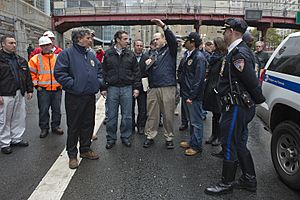
After Hurricane Sandy in October 2012, Cuomo allowed New York voters, via a specific provision aimed at accommodating those displaced, to cast provisional ballots for the 2012 election anywhere in the state. He also appointed a commission to examine the responses of New York utilities to damage caused by the storm.
Controversy ensued when the Cuomo administration used $140 million, including $40 million of federal disaster relief funds, to pay for the broadcast of national TV ads promoting "New New York" slogans outside New York in an attempt to attract new business investment to the state. Many have been critical of the effort, including former New York governor Eliot Spitzer, who called the ads "fluff" and "a waste of taxpayer money".
Hydraulic fracturing
In June 2012, the Cuomo administration said it was considering lifting a state ban on the practice of hydraulic fracturing (also known as "fracking") to stimulate the economy in upstate New York. But critics said that fracking upstate could contaminate the water supply of New York City, New Jersey and parts of Pennsylvania. Following a long-awaited study started years earlier, New York State health officials cited "significant public health risks" associated with fracking, and on December 17, 2014, the Cuomo administration announced a ban on hydraulic fracturing in New York State.
Israel
In solidarity with Israel, Cuomo announced an executive order against the Boycott, Divestment and Sanctions movement. Cuomo tweeted: "If you boycott Israel, New York State will boycott you."
New York City Subway
In June 2017, after a series of subway disasters, Cuomo declared a "state of emergency" for the New York City Subway system. According to The New York Times, a series of New York City mayors and New York governors, including Cuomo, were partly at fault for the worsening quality of the subway system and inflated construction costs. Under the Cuomo administration, the Metropolitan Transportation Authority repeatedly diverted tax revenues earmarked for the subways, paid for services that there was no need for and spent on subway projects that did not boost service or reliability. As a result, the MTA was saddled with debt and could not undertake investments into overhauling outdated and inefficient subway infrastructure. Cuomo also directed the MTA to spend on projects that the heads of the MTA did not consider to be priorities. One reason why the New York City subway system is so expensive is due to exorbitant labor costs; according to several M.T.A. officials who were involved in negotiating labor contracts, Cuomo pressured the MTA to accept labor union contracts that were extremely favorable to workers. The New York Times noted that Cuomo was closely aligned with the union in question and had received $165,000 in campaign contributions from it.
The New York Times reported, "Cuomo had steered clear of the M.T.A. during his first years in office, but in his second term he took an intense interest. He placed aides within the organization and, in an unusual move, made some report directly to him. He badgered transit leaders about the construction of the Second Avenue subway on the Upper East Side of Manhattan. And over the objections of some board members, he canceled several M.T.A. capital projects to make room for his own priorities. According to high-ranking current and former M.T.A. officials, the moves interfered with the authority's plans to address the rising delays."
Public college and university tuition
On April 18, 2017, Cuomo signed the New York State 2018 fiscal year budget. It included the Excelsior Scholarship, a provision that families making less than $125,000 in 2019 could have free tuition at all SUNY and CUNY universities, though some education experts including Sara Goldrick-Rab say it won't help the poorest students and that the requirement that recipients live and work in New York after graduating is counter-productive.
Public employees
On July 16, 2011, Cuomo finalized a five-year deal with the Public Employees Federation to end pay raises, implement furlough days, and require additional contributions to health insurance accounts. In an interview with The New York Times, he stated his top goal in 2012 is the reduction of public employee pensions.
Public housing
In the winter of 2018, Cuomo responded to a class-action lawsuit brought against the New York City Housing Authority by attorney Jim Walden on behalf of a group of public housing tenants. The suit was the first of its kind and called upon NYCHA to immediately address decrepit and unhealthy conditions in public housing units across New York City. By early April, Cuomo appointed an independent monitor to oversee NYCHA on an emergency basis.
Remarks about right-wing conservatives
In a January 17, 2014, interview with Susan Arbetter on WCNY's The Capital Pressroom, Cuomo stated:
[New York Republicans] are searching to define their soul, that's what's going on. Is the Republican party in this state a moderate party or is it an extreme conservative party? ... The Republican Party candidates are running against the SAFE Act – it was voted for by moderate Republicans who run the Senate! Their problem is not me and the Democrats; their problem is themselves. Who are they? Are they these extreme conservatives who are right-to-life, pro-assault-weapon, anti-gay? Is that who they are? Because if that's who they are and they're the extreme conservatives, they have no place in the state of New York, because that's not who New Yorkers are. If they're moderate Republicans like in the Senate right now, who control the Senate – moderate Republicans have a place in their state. George Pataki was governor of this state as a moderate Republican, but not what you're hearing from them on the far right.
This remark received a major reaction in the conservative media. Radio host Glenn Beck wrote a letter to the governor regarding the remarks from the interview. Fox News contributor and radio/TV show host Sean Hannity threatened to move out of the state with all of his assets if Cuomo did not apologize for his remarks. Cardinal Timothy M. Dolan, the archbishop of New York, said during a radio broadcast that Cuomo's remarks were "most unfortunate at best. Are there pro-lifers who are extremist? Yes, there are. But I think they are a distinct minority."
The New York State Democratic Committee, which is headed by Cuomo, supported his remarks and reiterated them in a May 2014 statement responding to a speech by Rob Astorino, who was running against him in the 2014 gubernatorial election: "Tea Party Republicans have done enough damage in Washington, today's speech made it abundantly clear that we don't need them here in New York."
Same-sex marriage
In keeping with a campaign promise, Cuomo signed the Marriage Equality Act, introducing same-sex marriage, on June 24, 2011, following an "intense public and private lobbying campaign", and later called for all states to do the same. Cuomo was lauded for his efforts to pass same-sex marriage legislation. One prominent advocate stated that for gay Americans, Cuomo was "the only national politician with hero status". Following the passage of the Act, Cuomo was criticized for describing the viewpoints of opponents as "anti-American". On July 25, 2011, a lawsuit was filed in the New York Supreme Court seeking an injunction against the Act, alleging corruption and violations of the law in the process of passing the bill. The trial court initially held that the plaintiffs' case could proceed, but the decision was reversed on appeal.
Cuomo ordered a boycott of Indiana and North Carolina to protest their legislation on LGBT issues.
Start-Up NY
In July 2016, the Empire State Development Corporation, a state agency, released a report indicating that the state's flagship business tax incentive program, called Start-Up NY, had generated 408 jobs since its inception in 2014. Ads promoting the program had cost at least $53 million. The Start-Up NY annual report was delayed three months in 2016, leading some lawmakers, such as Assemblyman Schimminger, to call the delays "curious".
Taxes
Cuomo was praised for his 2011 restructuring of the New York State tax code. He was also criticized for allegedly requesting a unanimous Assembly vote in favor of the proposal and threatening to campaign against Assembly members who voted "no" – a charge he denied. Cuomo also received criticism from voices on the left who felt that the tax reform was insufficient. Hoping that the Federal cap on state and local tax deductions will be repealed, Cuomo signed a tax increase on high income workers and corporations and the wealthy worth over one million dollars in 2021. The increase extends until the year 2027.
Voting rights
In April 2018, Cuomo announced that he would restore the voting rights of parolees through an executive order. He said that he would consider restoring the voting rights of all parolees (more than 35,000), and would also enfranchise new parolees throughout his term.
Post-gubernatorial career
Cuomo filed for a state retirement pension, to be effective September 1, 2021, based on 14.56 years of state service as attorney general and governor.
On March 3, 2022, during Cuomo's first public appearance since his resignation, he gave a speech at the God's Battalion of Prayer church in Brooklyn and came out against cancel culture and hinted at a political comeback. Cuomo said, "The press roasted me, my colleagues were ridiculed, my brother was fired. It was ugly. It was probably the toughest time of my life." In the speech before an ally's church, he said, "Contrary to what my political opponents would have you believe, nothing I did violated the law or the regulation."
On March 14, 2022, at an event to commemorate the 80th anniversary of the Warsaw Ghetto Uprising, Cuomo came out stating his plans to create an organization that will be called "Progressives for Israel". As part of his justification for this organization, he stated "You cannot denounce antisemitism but waver on Israel's right to exist and defend itself but it should be non-Jewish officials who speak first and loudest". Cuomo later declared "I am going to call the question for Democrats 'Do you stand with Israel or do you stand against Israel?'" This came amidst speculation that Cuomo intended to run in the 2024 United States Senate election in New York.
In February 2023, Andrew Cuomo criticized President Biden over the problems stemming from the Mexican border and migrants being displaced within the United States.
Cuomo has been frequently rumored to run as a candidate in the 2025 New York City mayoral election.
Electoral history
Personal life
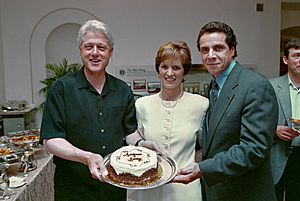
Cuomo married Kerry Kennedy, the seventh child of Robert F. Kennedy and Ethel Skakel Kennedy, on June 9, 1990. They have three daughters: twins, Cara Ethel Kennedy-Cuomo and Mariah Matilda Kennedy-Cuomo (born 1995), and Michaela Andrea Kennedy-Cuomo (born 1997). They separated in 2003, and divorced in 2005.
Cuomo began dating Food Network host Sandra Lee in 2005, and the couple moved in together in 2011. The two resided in Westchester County, New York. On September 25, 2019, the couple announced that they had ended their relationship. From the fall of 2019 until August 21, 2021, Cuomo lived in the New York State Executive Mansion on a full-time basis with his three daughters.
On July 4, 2015, Cuomo presided over the wedding ceremony of his longtime friend Billy Joel to his fourth wife, Alexis Roderick.
Cuomo is a Roman Catholic.
Cuomo drives a 1968 Pontiac GTO with the New York license plate of number "1".
Published works
See also
 In Spanish: Andrew Cuomo para niños
In Spanish: Andrew Cuomo para niños


